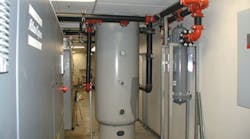From its facility on Long Island, Automatic Data Processing's (ADP's) Investor Communications Services Division runs a specialized printing and direct mail operation that prints, mails and sorts time-sensitive investor documents ranging from proxies and prospectuses to periodic reports. Beyond the employees and equipment, the facility and systems that make ADP one of the nation's largest business services firms, there is one simple element without which the 432,000-sq.-ft. plant doesn't run.
"Pretty much everything automated in the printing and mailing operation is pneumatic. Without compressed air, we don't run," said Alex Rivera, Facilities Supervisor at the ADP plant.
Notwithstanding its importance, the plant's compressed air equipment at the Long Island plant hasn't always been its most dependable feature. Plagued by oil leaks, mechanical breakdowns and poor design, the four-compressor system finally reached the breaking point when ADP initiated plans to expand its facility. The original compressors included two 50 hp and two 100- hp modulation-type machines without sequencers, stuffed together into a crowded room that made servicing the machines very difficult. The problems were especially severe during the three-month proxy season of March, April and May, when the four compressors had to run continuously at 100 percent to meet the plant's compressed air demand.
With the company's facility expansion plans triggering a parallel need for additional air production, Rivera called on Atlas Copco's New York distributor, Iacono, Inc., for help. Iacono, Inc.'s Rich Piquette described what he found, "The compressor room was so cramped you couldn't get from one end of the room to the other without coming in through another door."
For Rivera, better use of space was a hoped-for result, but the first, most important goal was the dependability of the compressed air system. ADP asked for a quote from Iacono for one 100 hp compressor, then for two compressors, and finally, for an entire compressed air system.
The subsequent system proposal, developed in conjunction with Atlas Copco's application specialist Will De Luca, included three 100 hp base compressors and one 100 hp variable speed drive (VSD) compressor. Explained De Luca, "Three base compressors are controlled by a sequencer that automatically runs one, two or all three in the most efficient manner possible. A VSD machine serves as a trimmer so compressed air production exactly equals demand. As the VSD unit reaches maximum output, the sequencer turns on another base machine, and the VSD trims the minor ups and downs."
The new system has made solid efficiency improvements to ADP's Long Island operation.
A centerpiece of the proposal was Atlas Copco's WorkPlace Systems, which fully integrates optional ancillaries such as air and condensate treatment equipment. The compact, self-contained units eliminate the problem of overcrowding in ADP's compressor room and allow for remote control. Energy management software would provide access to authorized users from remote computers running PC Anywhere.
ADP's Rivera gave Iacono the good news: he had the job as proposed if the system could be installed on a specific weekend that coincided with a planned plant shutdown. Iacono's president, John Iacono, Jr., agreed. "My crew worked two 16-hour days, said Iacono. "They removed every piece of old equipment, cleaned the room, and got two compressors on line in time for plant startup Monday morning. During the next week, they finished the installation and plumbed a totally professional and efficient compressor room."
The new system, now up and running, has made solid efficiency improvements to the Long Island operation. Even during the proxy season, only two of the four compressors a GA75FF running at 100 percent capacity and a GA75VSDFF typically running at 50 percent to 75 percent needed to be run. Overall, the system has saved ADP 125-150 hp of energy that had been wasted.
ADP is satisfied with its new system, according to Rivera, "During March, April and May, this building runs 24/7. The Atlas Copco compressors have worked very well for us. No problems." And, that level of performance is expected to continue, even if the plant's needs change or expand, said Rivera, "Even if air demand increases by 500 cfm, ADP will have a totally redundant compressed air system."
